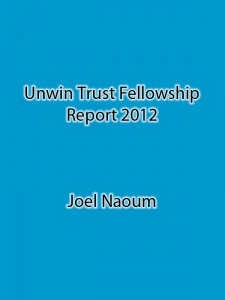Download the full report PDF here, or you can get it as an ebook in EPUB or Kindle format.
I don’t think many publishers are sitting there saying ‘What are our digital experiments, how are we measuring them let’s see how they’re working.’ I’d like to pretend I was structuring it that way but effectively I’m going ‘What can we do with this book. What are we doing that’s interesting? Let’s have a go and see what works.’[1]
The risk of undertaking a long-term research project in an area like digital publishing is that the goalposts are constantly shifting. When I first put together my proposal for the Unwin Trust Fellowship in early 2011, the Australian publishing industry was a significantly different place to what it is now. Most publishers were lucky to have around 2–3% of sales in digital, and there were still a few Australian publishers who weren’t selling ebooks at all. Amazon’s Kindle was available to Australians, but only by ordering internationally. The sight of an e-reader on public transport was a novelty. Nobody had heard of the Kindle Fire. REDgroup retail had only just gone into voluntary administration, and it was unclear then precisely what the fallout from the loss of almost a quarter of Australia’s book retail presence would be.
Although it’s hard to come by hard data about ebook sales in Australia, as I write this, anecdotally, every publisher I’ve spoken to saw exponential growth over the Christmas period. Ebooks went from being an experiment to worth millions of dollars in just a couple of years. There are multiple variations of the Kindle available in stores in Australia, and most publishers appear to be working with most major ebook channels to sell their books.
Internationally, the story is very different too. When I left for London I was told that US publishers were still light years ahead of the rest of the world, and that anything I learned from the UK would still be at least 18 months behind the true frontier in digital. But over Christmas, UK digital sales grew by almost 500%[2] and many US publishers reported a plateau in digital sales for the first time since 2007[3], causing many analysts to speculate that the UK industry is catching up to the US, at least in terms of market penetration.
The original proposal was to undertake a series of case studies of experiments in the digital space in order to have a close understanding of their success or failure and hopefully to draw some conclusions from these. As such, the project was structured around close working relationships with a number of key players in the UK publishing industry. I spent two weeks each working with Pan Macmillan’s digital team on the launch of their digital backlist imprint Bello; at HarperCollins with The Friday Project team on Authonomy and its new digital-only list and at Faber & Faber on their drama online project (in collaboration with Bloomsbury). In between placements I recorded many interviews with key players in the industry and visited the Frankfurt trade fair to attend the Tools of Change conference. All of my experiences were enormously helpful for both this report and my general understanding of the state of digital publishing in the UK and to a lesser extent in the US. As I conducted the interviews and compiled this report it became clear that there was significant overlap in certain key areas of experimentation within (and outside of) publishing houses in London. As such, the core of this report focuses on these key areas, and goes into specific case studies where the information gathered justifies it.
I’ve identified these key areas as pricing, interactivity and multimedia, partnerships, platforms and workflow. Within these areas of experimentation I’ve explored a number of case studies, including children’s publisher and interactive multimedia specialist Nosy Crow, Faber & Faber’s transformative partnership with Touch Press, HarperCollins’s Game of Thrones Enhanced Edition, Pan Macmillan’s Bello, The Friday Project’s Confessions of a GP, the revolutionary new digital publishing platform Unbound and Faber & Faber’s in-house digital workflow. Most information was gathered directly from sources in the form of recorded interviews and emails, but I have used sources from blogs and trade press to enhance this research where appropriate.
In addition to the limits mentioned above, the report also focuses mostly on trade publishing experimentation. Although I did interview a number of smaller companies working with disruptive business models and on experimental interactive projects, I felt that these were still very much book start-ups attempting to buy into the trade rather than step away from it (or dismantle it). To an extent this focus on publishers wasn’t self-imposed – although I tried I could not get an interview or speak with representatives from the largest digital book retailer in the UK (Amazon – ranging from 70 – 90% of the ebook trade, depending on who you speak to). Without their input, I felt that it would not be useful to go into detail on experimentation in digital retailing. Although other retailers are engaged in some genuinely exciting experiments, ultimately I didn’t feel I was adequately representing the market and my time was better spent concentrating on digital product experiments rather than innovative sales channels.
[1] Pack, Scott, publisher of The Friday Project, interview conducted 8/11/11
[2] Bowker (http://bit.ly/GNxSYH). 15/02/12
[3] Dead Tree Edition (http://bit.ly/GZjn29). 22/03/12
